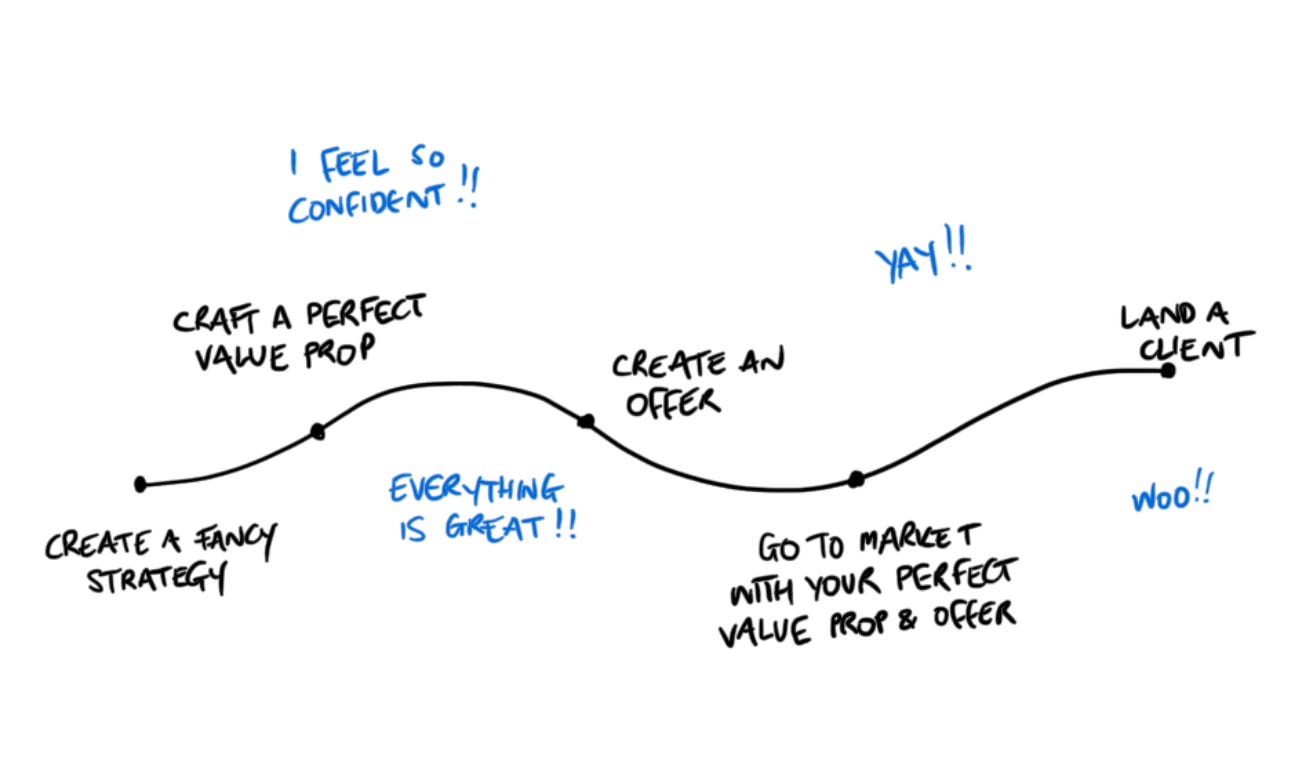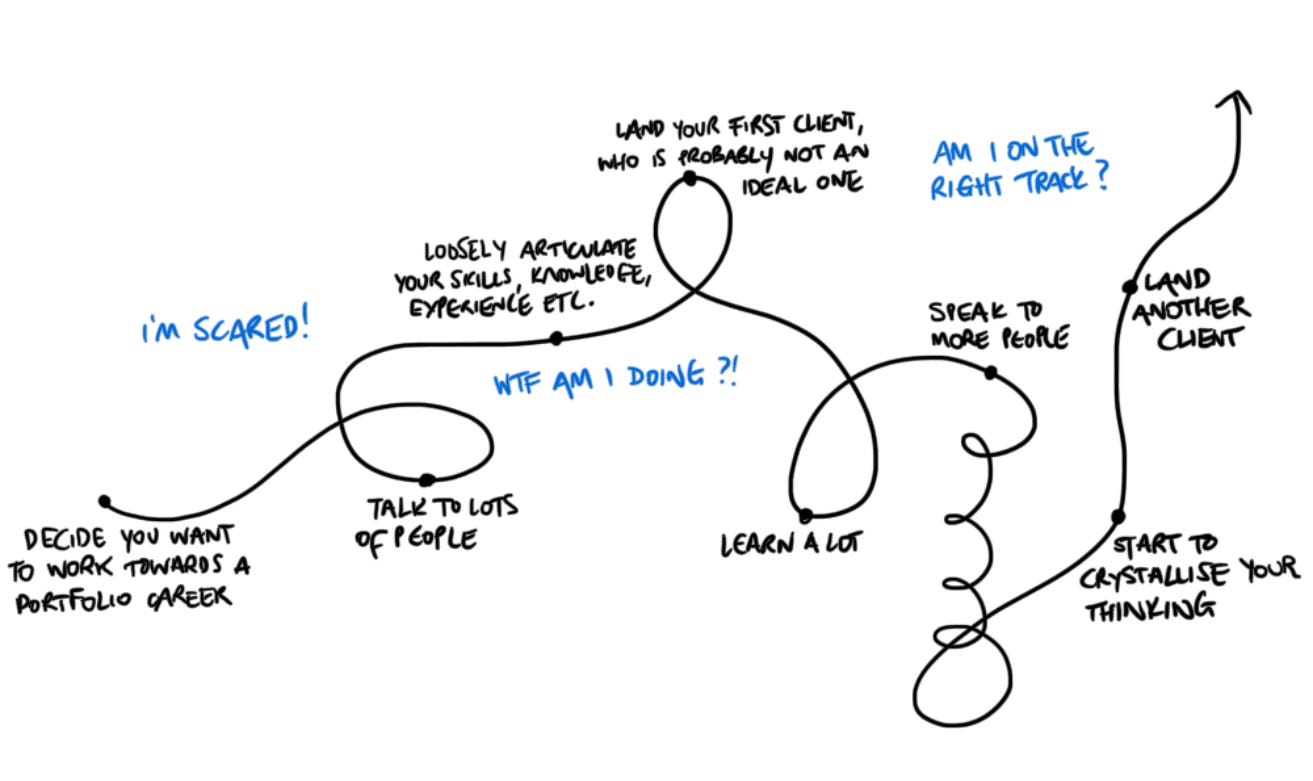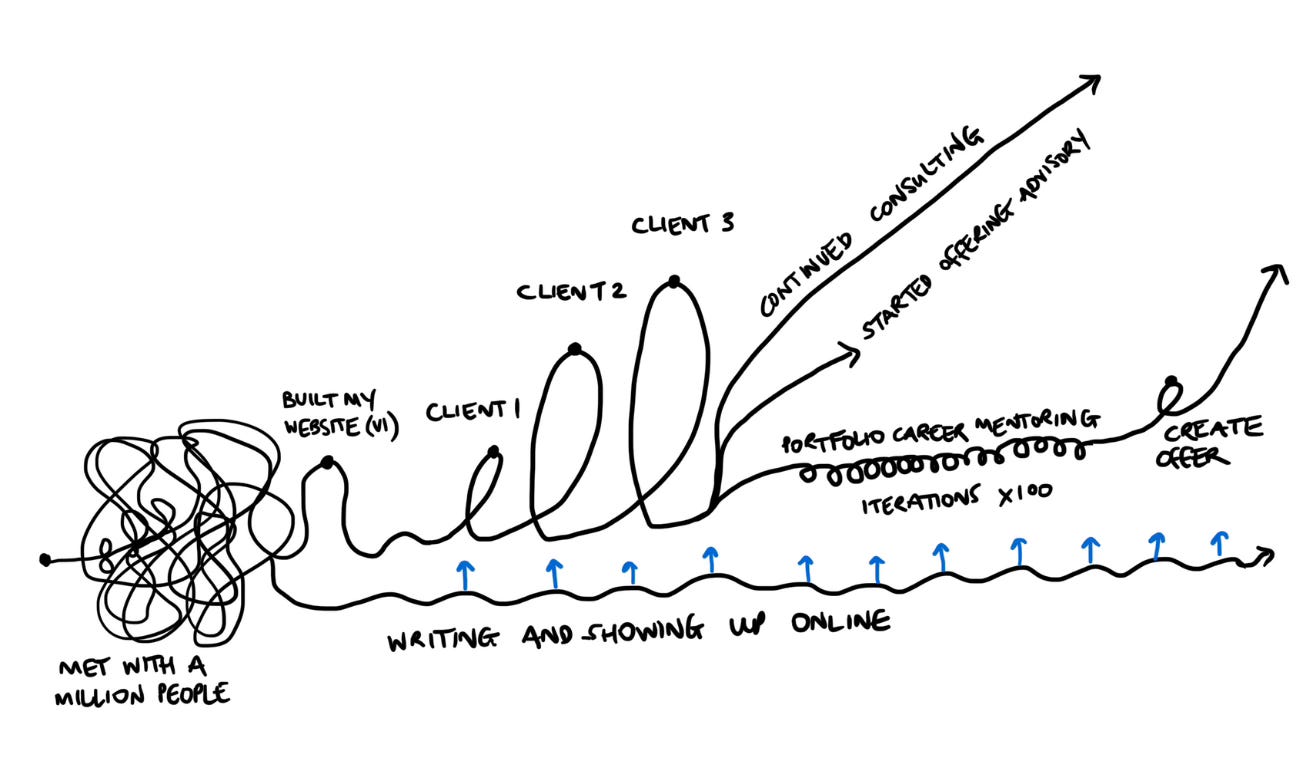"I want to build a portfolio career but don't know where to start"
How to stop procrastinating and take the first step towards creating a life you want.
I was 40 minutes deep into Netflix’s latest true crime documentary when I saw an email from a frustrated reader pop into the inbox:
“Hey Anna,
I love the idea of portfolio careers but I’m completely lost in terms of how to get things going.
How do I get from Point A (stuck in a stressful job) to Point B (going out on my own to build a portfolio career across a few areas; some I have experience in, and some that are just a pipe dream).
I’m desperate to make a change but it feels like I’m trying to put together an ice-white 10,000 piece puzzle. Impossible.”
Firstly, I’m sorry to say that I know nothing about puzzles, I’m more of a Lego-gal myself. Secondly, I know a lot about starting portfolio careers and deeply feel this reader’s struggle. It’s hard knowing where to start when you’re about to do one new thing - launch a business, pivot careers, build a product or explore a new passion - let alone create a portfolio made up of many.
Most people believe that starting their portfolio career looks like:
Creating a comprehensive strategy that includes a well-defined value prop, a structured set of offers, pricing that’s set in stone, a sales and marketing plan etc.
Going to market with said strategy
Landing their first client
Sounds logical. Right?
Wrong.
There’s a time and place for strategy my friend, but the beginning of your portfolio career journey is not that time and place. A fully fledged plan isn’t your first job to be done. Smashing your idea into reality is the starting point. Collecting real-time data is your job to be done. Testing and trying and learning and failing and continuing are the first sets of items on your to do list.
The idea of launching into something with minimal preparation probably makes your brow sweat just as much as being handed a ten thousand piece puzzle and a ticking time bomb. And I get why. I understand why you so desperately want clarity on your offer before you get out there and voice it. It’s a fear-of-being-judged-thing. It’s an I-don’t-want-to-look-like-an-idiot thing. It’s an I-don’t-know-what-I’m-doing thing.
But sometimes you have to look like a bit of an idiot and do things without knowing how. Sometimes you have to move without certainty and take a little risk to reap a big reward.
So if a strategy isn’t the starting point, then what is? Where do you begin when you want to do a million things? Where do you start when you have big dreams of multiple income streams, diverse projects across lots of industries, a variety of clients and many passions? Which lane do you pick if you want to cruise down them all?
Start with what you have
Here’s my POV from 15+ years in business and 5+ years of working for myself: start with your strengths, capabilities and the resources you currently have.
Who you are
You’re much more likely to create a career that’s energising and aligned if you’re clear about who you are. Ask yourself:
What are my strengths?
What do people say I’m good at?
What do people consistently seek my help with?
What do I feel energised by?
What do I value?
I recently went through this process with my mentee Lauren. She’s a corporate lawyer obsessed with all things words (a woman after my own heart) who has dreamed of starting her own copywriting business in the health and wellbeing space. She’s big into yoga, pilates, breath work and nutrition, and is especially savvy at taking complicated jargon and turning it into copy that the rest of us can understand.
What you know
Once you’re clear on your strengths and values, the next step is identifying the skills you already have. The ones people will pay you for. Rather than wasting hours trying to come up with an arbitrary offer that communicates what you could do in the future, think about what you’ve already done. Ask yourself:
What skills do I have that could be valuable to others?
What industry experience do I have that could be valuable to others?
What results have I created for my past clients, customers or employers?
What skills can I shop around right away?
In Lauren’s case, her legal skills were pretty niche but she had experience working with Fortune 500 clients and in broader professional services, as well as writing in many forms: legal, educational, informational and some narrative.
Who you know
Next it’s time to reach out to your existing contacts. Make a list of everyone within your network: people you’ve worked with in the past, who you’re connected with on social, even someone you met at an event six months ago. Then, armed with an understanding of who you are and what you know, reach out. Book a call and talk about what you’ve done. Share where you’re hoping to head next. Ask if they can make a relevant intro.
Lauren did just this. She booked 30+ calls with people in the professional services space and shared her portfolio career copywriting dream, asking everyone she knew for advice, guidance and connections. One conversation surprisingly turned into a referral for a copywriting gig at an accounting firm. Was this an ideal client? No. Was it worthwhile? ABSOLUTELY. There’s nothing quite like seeing that first self-generated dollar hit your bank account, and you never know where one client or project will lead (in her case this led to another referral for a client in her target industry of health).
These initial conversations and early clients might seem pointless but they’re not. The more chats you have, the more you’ll understand what the market is looking for. The more projects you take on, the better positioned you’ll be to craft a value prop and offer that a) you enjoy delivering and b) actually sells.
Start where you are
It might seem reductive, but starting where you are is the quickest route to where you want to go. Speaking to who you know > trying to get in front of people you don’t. Selling the skills you have > trying to market the ones you haven’t yet developed. Starting where you are = getting runs on the board = building confidence = having the guts to go after bigger opportunities = more experience = leveraging that experience to expand into products and new income streams.
So dive in. Without a strategy. Without a plan. Without an offer. With or without fear.
When you do, one of these days a conversation will become a client. One of these days you’ll stumble across an opportunity you could have never planned for. One of these days you’ll wake up and realise that through the very process of winging it, you’ve flown all the way to clarity. You’ll discover the common thread weaving its way through your diverse skills, interests and experience. You’ll know exactly what your offer is. You’ll know who it’s for, what to charge and how to build.
One of these days things will fall into place.
Just like that final ice-white puzzle piece.
🎙️ How I started my own portfolio career:
How I started with who and what I knew [2:12]
The first real opportunity I uncovered after lots of conversations [3:36]
How I landed a client in tech with no tech experience [5:04]
Why I decided to launch a new advisory revenue stream [6:44]
Why I’ve been selling and delivering portfolio career mentoring over the last 4ish months without it being packaged into an offer [7:48]
Where you start won’t be where you end up [10:40]
When is the time and place for a well considered strategy [11:36]
❤️🔥 Subscribe for more ideas and frameworks…
…to help you build a financially lucrative and creatively fulfilling portfolio career and life.








No one can start taking action only after considering all factors or having all conditions in place. Begin with your strengths, start now, keep trying and making mistakes, and you will reap rewards.
Would love to know how you'd recommend going about reaching out to your network! This is usually where I hesitate the most (don't want to be seen as desperate, a burden, etc.).